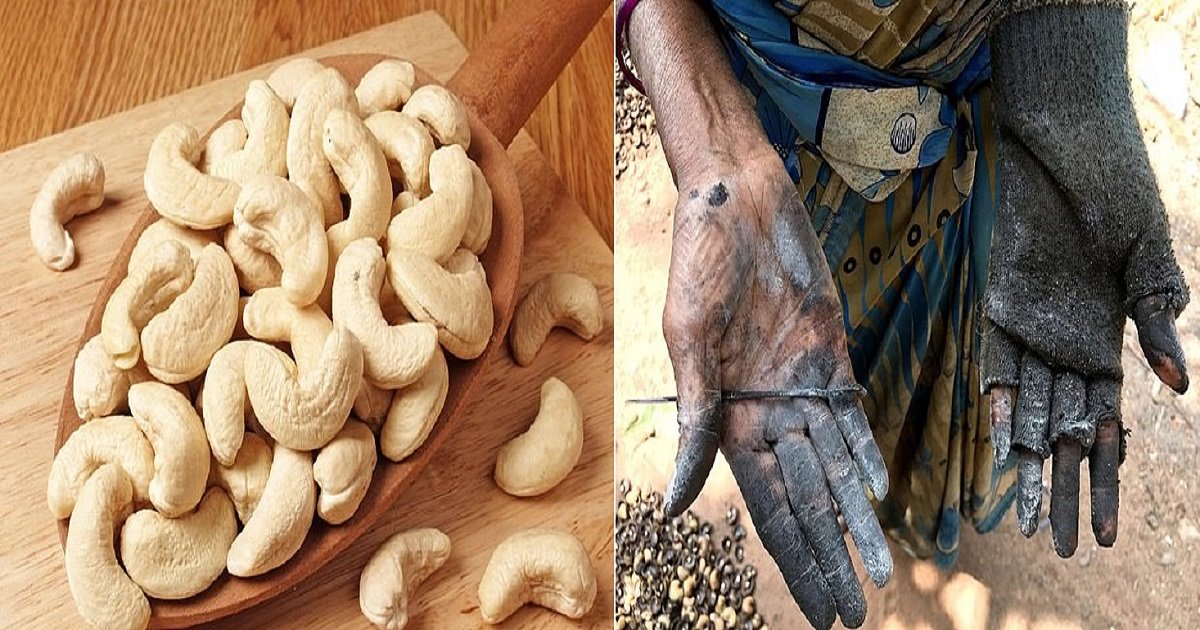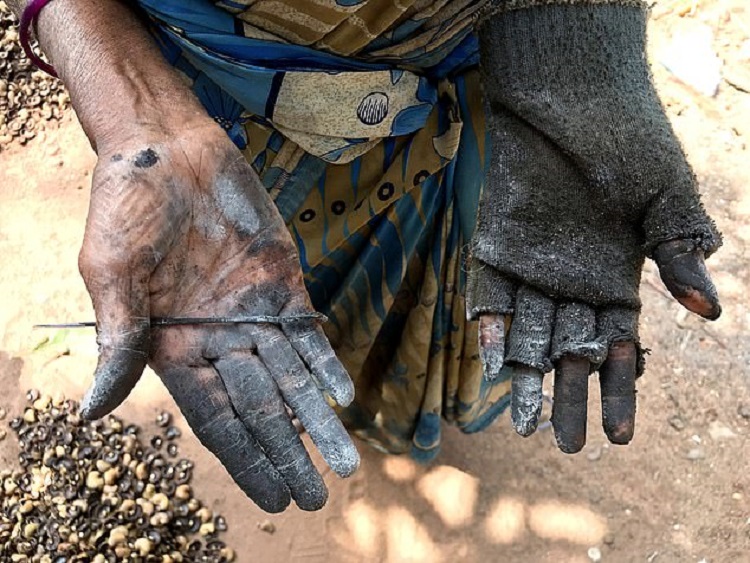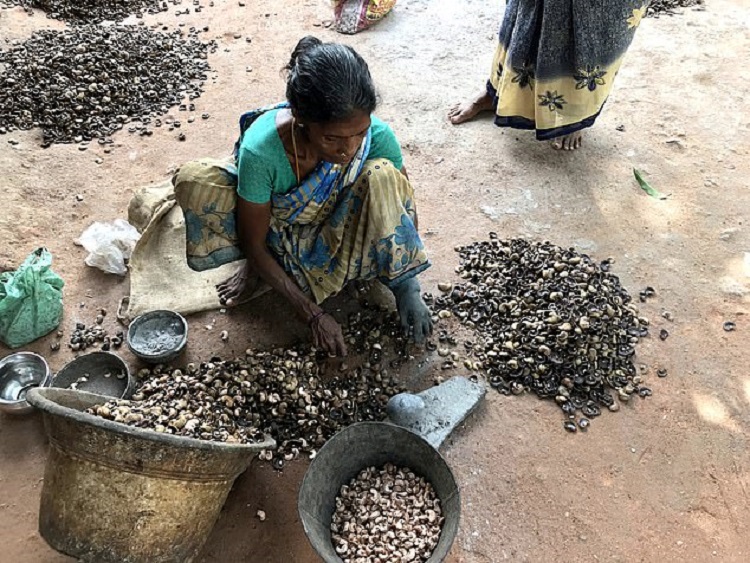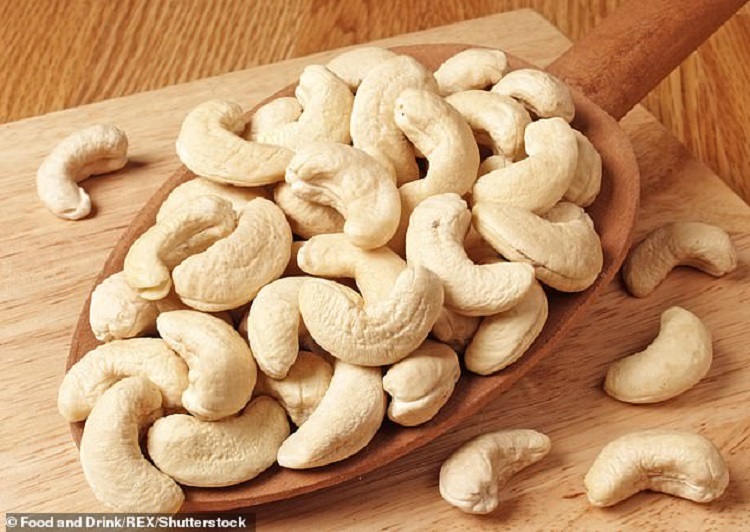As people are starting to realize the importance of a good and balanced diet for better health, veganism has also seen a rise in popularity.
One staple that people are frequently crazy for are cashews because it’s a good source of protein, magnesium, potassium, iron, and zinc. The monounsaturated fats found in the nuts also help protect against heart disease.
It’s no wonder then that cashews can often be found in a variety of foods such as energy bars, butter, and salads as well as in vegan-friendly alternatives to milk, cheese, and creamy puddings.
But not many know that there is a hidden cost to enjoying the benefits of this superfood, one paid for in pain and suffering.
Femail reporter Emily Clark wanted to find out more about how cashews are processed and she traveled to India to find out more. What she discovered shocked her.
Almost all the cashews are processed in India or Vietnam. They are difficult to extract and therefore need to be shelled by hand. Cashew has two layers of hard shells and between those layers are cardol and anacardic acid, caustic substances that can cause vicious burns.
For the up to 500,000 workers in India’s cashew industry, almost all women, burns are a fact of life. Since they are working without contracts, there is no guarantee of steady income nor pension or holiday pay.
A lot of the workers don’t have gloves and probably wouldn’t even wear them even if they did. This is because gloves would slow shelling down and that would reduce their income because they are paid by the kilo.
Medicine for the pain is often unaffordable so they just soothe the acid burns with ash from their cooking fires.
Clark said, “I was horrified when I found out my diet might be funding this misery. I’m a vegan, and the dairy-free ‘cheeses’ I love typically use cashews. The creamy sauces I love in pasta bakes do, too.
“But I had no idea about how they were being produced. And so I traveled to the village of Pudhukuppam in the Indian state of Tamil Nadu to meet the nut shellers.”
One of the people she interviewed is 30-year-old Pushpa Gandhi, in southern India. She has been working for six years as a nut sheller and her hands are covered in burns. Chopping onions and chilies are torture yet daily she prepares dinner for her husband, daughter, and two sons.
Poor people in India have no access to knives and forks, so she eats with her hands. As such, even eating spicy curry can make her cry out in pain.
Pushpa had wanted to study English at university and become a teacher. But because her parents didn’t approve, she married at 18 and started working. She was a farm worker at first before becoming a cashew sheller.
Clark relates, “Sitting on the ground among heaps of cracked cashew shells, she says her life is over. It’s not just the repetitive work that has worn her down. Her face and arms bear similar scars to her hands, caused by the cashew acids.”
Just five hours into her day Pushpa laments, “It’s already starting to burn. Today when we go home and wash, we will see the boils on our skin. It takes about a week for them to heal. But as the old ones heal, new ones keep coming.”
The charity Traidcraft Exchange places the blame for these conditions on the way European buyers aggressively push prices down thus forcing cashew companies to utilize cheap labor.
“Follow cashew supply chains back and you will find women and children in unregulated shelling units all over India,” Clark said.
In Vietnam, they managed to design and build their own cashew machinery to cut labor costs. But India is unable to follow suit because most growers haven’t managed to invest in it.
Uma Jayamurthi, a nurse at the local Cuddalore medical center, said she had seen several patients over the last year who have chopped off the top of a finger. Roughly 40 percent of the patients at the center have cashew-related injuries.
“The main reason people come here is when the cashew acid goes under their nails and it gets infected,” says Uma.
But because of the cost, they only come when the pain is “unbearable,” Uma adds.
The British Retail Consortium, which represents supermarkets, defended itself by saying they have “robust safety and welfare standards and support suppliers in meeting these through audits, training and in-depth interviews with workers.”
A spokesman added: “Retailers are conscious of the problems that exist in parts of India’s cashew industry and therefore are careful to work with suppliers who provide decent working conditions.”
But Fiona Gooch, of Traidcraft Exchange, countered that producers “are under too much [price] pressure” to comply with agreements.
Gooch recommends cross-checking of wage slips and supermarkets should send inspectors to the cashew factories.
Clark concludes, “However, factory visits can only do so much as workers cannot always speak freely.
“As customers, we can act too. By contacting supermarket head offices by email, phone or letter we can demand that they are meeting their obligations.”
Recommended Video – “King Cobra Spits Out Nine Chicken Eggs After It Was Caught By A Snake Charmer In A Village In India”





